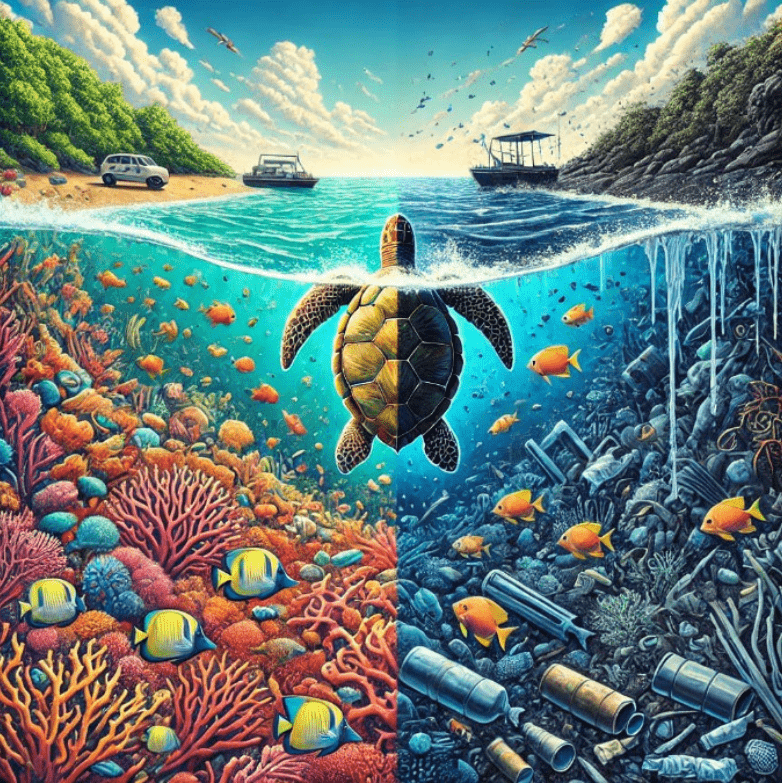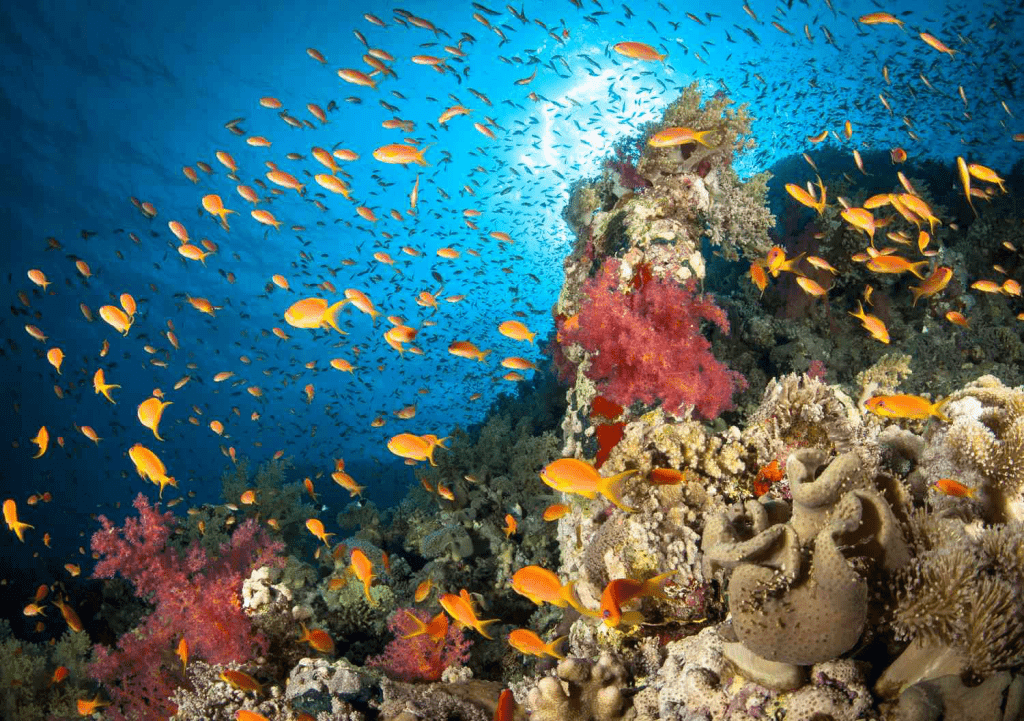Did you know that by 2050, plastic in the ocean could outweigh all the fish in it? Every year, an astonishing 33 billion pounds of plastic enters our oceans, contributing to an estimated 75 to 199 million tons of plastic waste already polluting marine ecosystems. If this trend continues, by 2050, the weight of plastic in the ocean could surpass that of all the fish in the sea. The consequences are terrible; nearly 1,000 species of marine animals are affected by ocean pollution, with over 500 areas now classified as ‘dead zones’, devoid of the life they once sustained. These alarming figures highlight the urgent need to address the mounting threats to our oceans and safeguard the vital ecosystems that support life on Earth.

Pollution: The Invisible Threat to Marine Life
Pollution occurs when harmful substances or energy, such as light or heat, enter the environment in amounts that negatively impact humans, animals, and plants. These pollutants disrupt ecosystems, often harming or killing the organisms within them.
Covering more than 70 percent of our planet, oceans are among the earth’s most valuable natural resources. They administer the weather, clean the air, help feed the world, and provide a living for millions. They also are home to most of the life on earth. Yet we’re bombarding them with pollution. And from dangerous carbon emissions and choking plastic to leaking oil and intentional discharge and ocean mining, the types of ocean pollution that humans generate are vast. As a result, collectively, our impact on the seas is degrading their health at an alarming rate.
Did you know about the Great Pacific Garbage Patch? It is a collection of litter; primarily microplastics — in the North Pacific Ocean and is actually composed of two separate large patches, the Western Garbage Patch and the Eastern Garbage Patch.
By reducing our use of single-use plastics, reducing chemical fertilizer usage, recycling properly, participating and organizing in beach cleanups. A drastic reduction in unnecessary plastic is crucial to solving the global pollution crisis, according to the UN Environment Programme (UNEP).
Overfishing: The Fight for Ocean Health

Overfishing is a major threat because it depletes resources and destabilizes ecosystems. However, this practice continues to be heavily supported by governments. According to the United Nations Food and Agriculture Organization (FAO), 34.2% of fisheries are overfished, which is 22.7% of seafood.
Overfishing also causes harm to the seabed, particularly through the use of nets towed by ships. Billions of people rely on fish for protein, and fishing is the principal livelihood for millions of people around the world.
Protecting marine ecosystems requires sustainable fishing practices, supported by scientific research and the establishment of Marine Protected Areas. Enforcing stricter regulations and empowering local fishing communities with education and resources can drive change at the grassroots level. Consumers also play a vital role by choosing certified sustainable seafood, fostering demand for responsible practices. Together, these efforts can ensure to overcome the threat of overfishing.
Climate Change: The Ocean’s Silent Struggle

A 2019 study found that oceans had sucked up 90% of the heat gained by the planet between 1971 and 2010. Another found that it absorbed 20 sextillion joules of heat in 2020 which is equivalent to two Hiroshima bombs per second.
Climate change is profoundly warming up the oceans, acidifying and deoxygenating them while driving sea levels higher and melting of polar ice caps. In turn these worsen existing threats to marine life from overfishing, pollution, and habitat destruction. The consequences, such as coral bleaching, destruction of sea-ice habitats, and disruption of ocean currents, indicate the dropping effects of climate change upon marine life and the fragile balance of ocean ecosystems.
This issue requires ocean-based solutions that balance progress with sustainability. To meet the growing demand for energy without causing destruction of marine ecosystems, ocean-based renewable energy sources like wind and tidal power can be utilized. Accordingly, the International Maritime Organization (IMO) set a goal for net-zero emissions in maritime transport by 2050, in line with global climate goals.
Decarbonization of coastal tourism is equally important, with cruise ships being one of the excessive polluters, as it has the carbon footprint equivalent to 12,000 cars. These actions put together will pave the way for a sustainable, climate-resilient future.
Towards a Sustainable Ocean Future
The picture seems disastrous, but there is good news: all these threats to the balance of marine ecosystems can be mitigated and even prevented, it is not too late! Although this is an issue that is too vast and huge for a mere human’s control, it is every one of us who will start a change for a better revolution.

Habits are hard to change, but even a small individual will make a difference. Here are some new habits each one of us could start implementing:
- Swap plastic bags for reusable ones.
- Reduce the use of disposable plastics like bottles and cups.
- Eat less fish and meat.
- Try to encourage investment in ocean-based energy.
- Buy food and cleaning products in bulk to avoid wrappings.
- Choose metal or glass food containers and storage options.
- Avoid cosmetics that contain plastic microspheres or microbeads.
- Promote research and awareness.
“You will love the ocean. It makes you feel small, but not in a bad way. Small because you realize you’re part of something bigger.” –Lauren Myracle
Every action, no matter how small, contributes to building a brighter, more sustainable future. By making mindful choices and working together, we can overcome this trivial issue at hand. Let’s start today, striving for a better tomorrow; one step, one habit, one deed at a time.
References
Fava, M. (2022, May 09). The Treaths to the Ocean in 2022 and How to Prevent Them. Retrieved from oceanliteracy.unesco.org: https://oceanliteracy.unesco.org/threats-to-the-ocean/
Ocean Threats. (n.d.). Retrieved from National Geographic: https://www.nationalgeographic.com/environment/article/ocean-threats
Ukpanah, I. (2024, August 08). Ocean Pollution: A Deep Dive into Current Statistics and Trends. Retrieved from greenmatch.co.uk: https://www.greenmatch.co.uk/ocean-pollution-facts
Image Courtesy
image 1: https://shorturl.at/4DuQY
Image 2: https://shorturl.at/MvSxg
Image 3: https://shorturl.at/LytP9
Written by: Vishael Denislaus

Leave a Reply